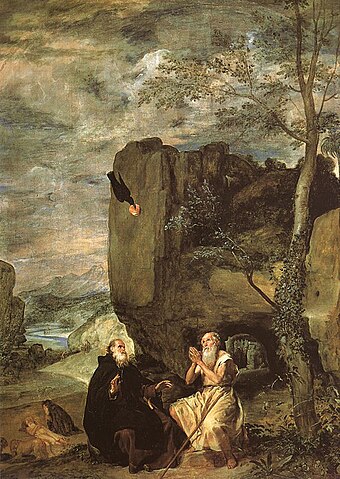Sun. July 27, 2014 (Derek Carr)
Derek Carr (Reader at our neighbouring church, Our Lady of Perpetual Help, and Professor Emeritus at UBC), spoke on "The
Holy Hermits" by Diego Rodríguez de Silva y Velázquez (baptized June 6, 1599 – August 6, 1660), a leading painter from
the Spanish Golden Age. Although most of his works were secular, "The Holy Hermits" stood for centuries as a powerful
portrait of prayer and meditation in a rural setting which was far removed from the hustle of Spanish commerce and shipping to and from the New World. The painting shows St. Anthony visiting St. Paul in the desert. This St. Paul (229-342) was an Egyptian who fled to the desert to escape persecution. He reportedly lived alone for some 90 years. St. Anthony, often considered the father of the anchorites (hermits), was led to visit this Paul, partly to learn that others were expressing their faith as he had been doing, but without his knowledge--although physically alone, he was
not alone in the ideal of meditating. The painting leads one to contemplate contemplation itself, extended meditation, the role of prayer, the tension that arises from wanting to be separate from the world and yet helpful to it. Derek later commented that Catholicism generally does not teach silence and meditation unless one joins specific groups devoted to those disciplines; in fact, there is virtually no silence in a Mass, in saying the rosary, or in following the Offices. [JEK]
Listen to the sermon audio MP3 recording from Sunday, July 27th, 2014 using your browser's preferred media player.
Listen to the sermon audio MP3 recording from Sunday, July 27th, 2014 using your browser's preferred media player.
Labels: PGIMF sermon discussion



